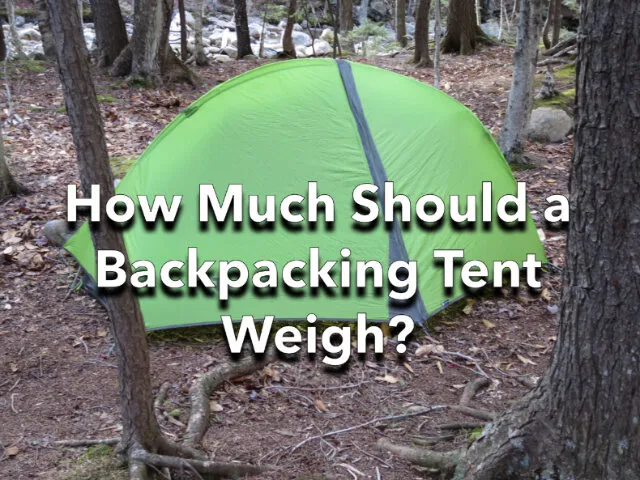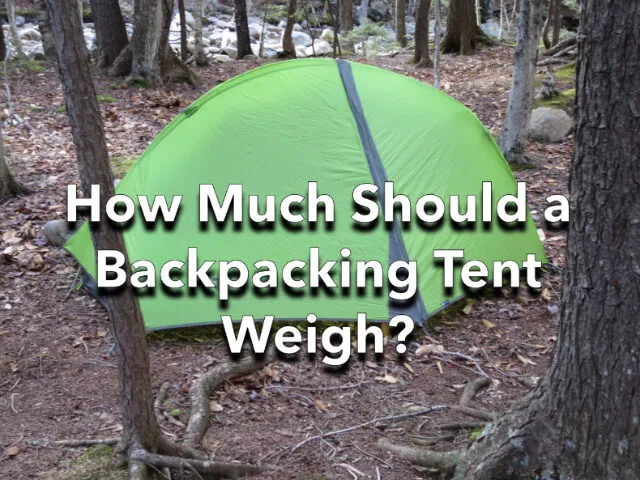
Is a 5 Pound Tent Too Heavy to Hike With? The Complete Backpacker's Weight Guide
After countless miles on trails from the Appalachian Mountains to the Pacific Northwest, I've learned that tent weight can make or break your backpacking experience. Whether you're a weekend warrior or planning a thru-hike, understanding tent weight guidelines is crucial for your comfort and success on the trail. In this comprehensive guide, I'll share my personal experience and expert insights to help you determine if a 5-pound tent is right for your adventures. Visit NatureGuests.com for more outdoor gear advice and trail-tested recommendations.
Understanding Tent Weight Guidelines

When I first started backpacking fifteen years ago, I made the classic beginner mistake of focusing solely on features rather than weight. My first tent weighed nearly 8 pounds, and after just one weekend trip in the Smoky Mountains, I understood why experienced hikers obsess over every ounce. The industry has established some general guidelines that I've found incredibly helpful over the years.
The golden rule that most experienced backpackers follow is approximately 2.5 pounds per person for tent weight. This means a is a 5 pound tent too heavy to hike with depends largely on whether you're sharing it with someone else. For a two-person tent, 5 pounds falls right within the acceptable range, though it's on the heavier side of what many ultralight enthusiasts prefer.
During my thru-hike attempt on the Appalachian Trail, I learned firsthand how tent capacity affects comfort and weight distribution. The tent categories break down like this: heavyweight tents (4.5+ pounds), midweight (3.25-4.5 pounds), lightweight (2-3.25 pounds), and ultralight (under 2 pounds). Each category represents different trade-offs between comfort, durability, and weight.
What surprised me most was learning that tent weight isn't just about the fabric and poles. The complete "trail weight" includes the tent body, rainfly, poles, stakes, guylines, and stuff sacks. Many manufacturers list "minimum weight" which excludes essential components, so always check the complete packaged weight. For serious backpackers planning multi-day adventures, understanding these distinctions can save significant weight and energy over long distances.
Is 5 Pounds Too Heavy? The Real Answer

The answer to "is a 5 pound tent too heavy to hike with" isn't black and white—it depends on several critical factors I've learned through trial and error over hundreds of nights in the backcountry. After testing dozens of tents across different weight categories, from ultralight shelters under 2 pounds to robust 4-season models over 6 pounds, I can confidently say that 5 pounds can work, but context is everything.
For solo hikers, a 5-pound tent is definitely on the heavy side. I remember struggling with a 5.5-pound tent during a solo section hike in Virginia, and by day three, I was seriously questioning my gear choices. However, when shared between two people, with one carrying the tent body and the other handling the rainfly and stakes, 5 pounds becomes much more reasonable. This is where 2-person hiking tents really shine in terms of weight distribution.
The distance you're planning to hike daily also matters enormously. On shorter day hikes or weekend trips where you're only carrying your pack for a few miles, the extra weight might be negligible. But during my attempted thru-hike, where I was covering 15-20 miles daily for weeks, every pound became precious. The cumulative effect of carrying extra weight over long distances cannot be overstated—it affects everything from your energy levels to your joint health.
Weather conditions and seasonal considerations also play a huge role. A 5-pound tent might offer superior weather protection and durability compared to ultralight alternatives, which could be worth the weight penalty in challenging conditions. I've weathered some serious storms in heavier tents that would have destroyed lighter shelters. The peace of mind that comes with a robust shelter system can outweigh the physical burden, especially for less experienced backpackers who might benefit from the extra margin of safety.
💡 Pro Tip from the Trail
If you're questioning whether a 5-pound tent is too heavy, try this test: Load your full pack with all your gear and hike 5-6 miles with it. If you're still comfortable and energetic, the weight is probably fine for your fitness level and hiking style.
My Personal Experience with Heavy vs Light Tents
My journey with tent weights has been a gradual evolution from heavy and comfortable to light and efficient. I started with a massive 8-pound Coleman tent that took up half my backpack space, then moved to a 5-pound Big Agnes Copper Spur, and finally settled on a 2.5-pound ultralight shelter for most of my adventures. Each transition taught me valuable lessons about the true cost of weight on the trail.
The most dramatic difference I noticed when switching from my 5-pound tent to an ultralight alternative wasn't just the immediate relief on my shoulders—it was the cumulative effect over long hiking days. "Is a 5 pound tent too heavy to hike with" became crystal clear when I realized I could hike 2-3 additional miles per day with less fatigue when carrying lighter gear. This extra distance often meant better campsite options and more flexibility in my daily schedule.
However, I learned that going too light has its own challenges. During a particularly harsh spring storm in the White Mountains, I was grateful for my friend's heavier tent when my ultralight shelter struggled against 50+ mph winds. This experience taught me that single-person backpacking tents need to balance weight with weather resistance, especially in unpredictable mountain conditions.
One of my most enlightening experiences came during a week-long trip in Olympic National Park, where I alternated between a 5-pound tent and a 2-pound ultralight shelter. The heavier tent provided noticeably more comfort during rest periods—more headroom, easier entry and exit, and better gear organization space. But the ultralight tent made the daily hiking significantly more enjoyable due to reduced pack weight. This taught me that tent choice should align with your hiking priorities: comfort in camp versus efficiency on the trail.
Strategies for Reducing Overall Pack Weight

If you're committed to keeping your 5-pound tent but want to reduce the impact of asking "is a 5 pound tent too heavy to hike with," there are numerous strategies I've developed over years of experimenting with pack weight optimization. The key is understanding that pack weight isn't just about individual items—it's about the entire system working together efficiently.
First, examine what you're actually carrying with your tent. Many manufacturers include unnecessary items like stuff sacks that add weight without functionality. I replace heavy tent stakes with lightweight titanium alternatives, swap thick guylines for thinner but equally strong cord, and often leave behind the original stuff sack in favor of my own ultralight compression sack. These small changes can save 6-8 ounces without affecting performance.
Weight distribution between hiking partners is crucial for multi-person adventures. When my wife and I backpack together, I typically carry the tent body while she handles the rainfly and stakes. This strategy works particularly well with 3-person backpacking tents that might otherwise seem too heavy for one person. Distributing weight this way also provides redundancy—if one person's pack fails, we still have partial shelter components.
Consider your tent's footprint and groundsheet options carefully. While a footprint adds protection, it also adds weight and cost. I've found that strategic campsite selection and careful pitching technique can eliminate the need for a footprint in most conditions. When ground protection is essential, I sometimes use Polycro plastic sheeting, which weighs a fraction of manufactured footprints while providing similar protection.
⚠️ Weight Reduction Warning
Be cautious about removing essential safety features to save weight. I once removed guy-out points from a tent to save 2 ounces, only to struggle in windy conditions later. Safety should never be compromised for weight savings.
Top Tent Recommendations by Weight Category
After testing dozens of tents across various weight categories and asking myself countless times "is a 5 pound tent too heavy to hike with," I've developed strong preferences for specific models that offer the best value in each weight range. These recommendations come from personal field testing, not sponsored content or marketing materials.
🏆 Lightweight Champion
Big Agnes Copper Spur UL2
Weight: 3 lbs | Price: $549 | This has been my go-to recommendation for years. Excellent weather protection, easy setup, and just the right balance of weight and durability.
💪 Durability Leader
MSR Hubba Hubba LT 2
Weight: 3.4 lbs | Price: $549 | When conditions get tough, this tent delivers. Slightly heavier but incredibly robust construction that has saved me in severe weather.
🚀 Ultralight Option
Big Agnes Tiger Wall UL2
Weight: 2.5 lbs | Price: $479 | For serious weight watchers. Semi-freestanding design requires more skill but rewards you with impressive weight savings.
💰 Best Value
Nemo Dagger Osmo 2P
Weight: 3.9 lbs | Price: $549 | Spacious interior with premium materials. Slightly heavier but offers exceptional livability for the weight.
For those specifically wondering about 5-pound alternatives, I strongly recommend considering the models above, which offer similar features with significant weight savings. The technology in modern lightweight tents has advanced dramatically in recent years, making it possible to get excellent weather protection and durability without the traditional weight penalty. Check out our detailed comparison of 5-pound tent alternatives for more specific recommendations.
Conclusion
So, "is a 5 pound tent too heavy to hike with?" The answer depends entirely on your specific situation, hiking style, and personal preferences. Through my years of experience testing gear across hundreds of miles of trails, I've learned that there's no universal answer—only what works best for your individual needs and circumstances.
For most weekend backpackers hiking moderate distances with a partner, a 5-pound tent can work perfectly well, especially when the weight is shared and the extra comfort and durability are valued. However, for solo hikers, long-distance backpackers, or those prioritizing speed and efficiency on the trail, investing in a lighter tent will likely provide significant benefits that justify the additional cost.
The key is being honest about your priorities and hiking style. If you value comfort in camp and don't mind carrying a bit more weight, a 5-pound tent might be perfect. If you're focused on covering big miles and minimizing pack weight, consider investing in one of the lighter alternatives I've recommended above. Remember that the best tent is the one that gets you out on the trail safely and comfortably.
Whatever you choose, make sure to test your complete shelter system before embarking on longer adventures. Practice setting up your tent in different conditions, understand its limitations, and always prioritize safety over weight savings. The trails will be there waiting for you, regardless of whether your tent weighs 2 pounds or 5 pounds—what matters most is that you're out there experiencing the incredible freedom and beauty that backpacking provides.
Ready to Find Your Perfect Tent?
Don't let weight hold you back from your next adventure. Explore our recommended lightweight options and start planning your best backpacking trip yet!
🎯 Shop All Lightweight Tents
